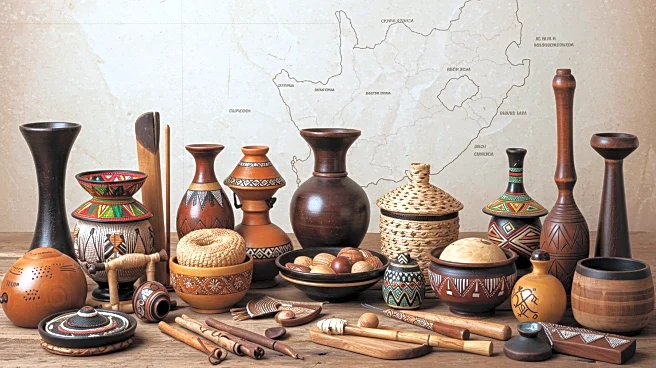What's Happening?
Southern African leaders are convening in Madagascar to discuss strategies for enhancing regional self-reliance and reducing dependency on foreign aid. The Southern African Development Community (SADC) summit, hosted in Antananarivo, marks Madagascar's first presidency of the bloc. Leaders from 16 countries are focusing on boosting intra-regional trade and minimizing reliance on external partners. The summit's theme emphasizes removing trade barriers and retaining more economic value within the region. Executive Secretary Elias Magosi highlighted the challenges posed by higher customs tariffs, diminishing aid, and political unrest abroad, advocating for increased intra-regional trade and infrastructure investment. The SADC aims to increase manufacturing's contribution to GDP from 11% to 30% by 2030, fostering an economy resilient to global market fluctuations.
Why It's Important?
The push for self-reliance among Southern African nations is crucial in light of global economic instability and reduced foreign aid. By strengthening intra-regional trade and manufacturing, the SADC seeks to build a more autonomous and competitive economy. This initiative could significantly impact the region's economic stability, reducing vulnerability to external shocks. Countries within the SADC stand to benefit from increased economic collaboration, potentially leading to job creation and improved infrastructure. However, political tensions in Madagascar, highlighted by criticisms from former presidents, underscore the challenges in achieving these goals. Addressing these internal issues is vital for the credibility and success of the SADC's self-reliance agenda.
What's Next?
The SADC's focus on self-reliance will likely lead to increased efforts to remove trade barriers and invest in infrastructure. Member states are expected to collaborate on leveraging their combined maritime, economic, environmental, and cultural resources. Political tensions in Madagascar may influence the summit's outcomes, with criticisms potentially affecting the region's unity and progress. The SADC's goal to triple manufacturing's GDP contribution by 2030 will require coordinated policy changes and investments across member states. The success of these initiatives will depend on overcoming political challenges and fostering regional cooperation.
Beyond the Headlines
The summit's emphasis on self-reliance reflects broader trends in global economic policy, where regions seek to mitigate external dependencies. The SADC's approach could serve as a model for other regions facing similar challenges. The political dynamics in Madagascar highlight the importance of stable governance in achieving economic goals. The criticisms from former presidents point to the need for transparent and inclusive political processes to support economic initiatives. Long-term, the SADC's focus on manufacturing and trade could lead to significant shifts in the region's economic landscape, promoting sustainable development and resilience.









